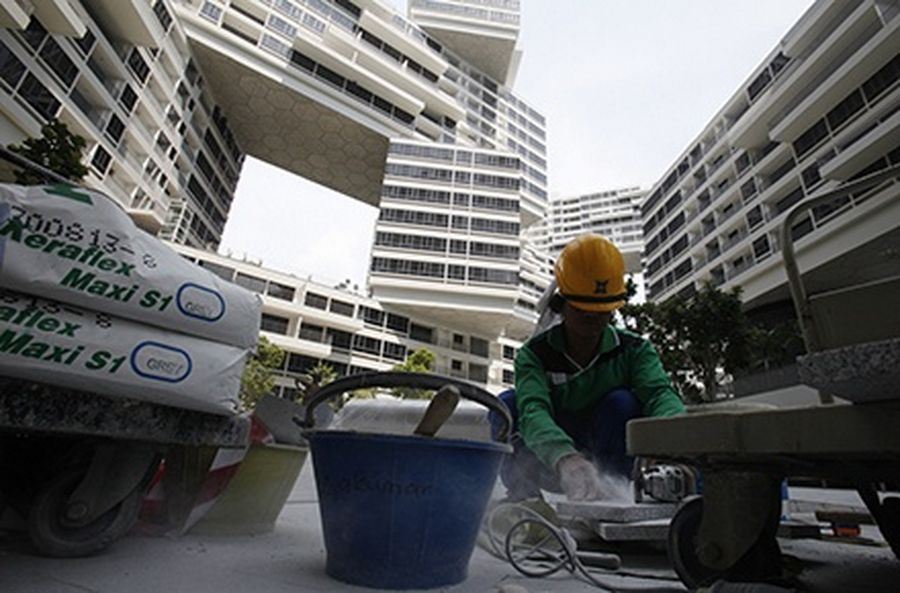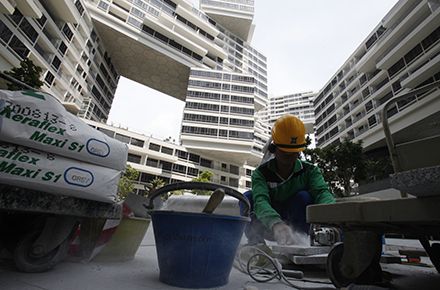Singapore is holding off growing regional competition for listings of real estate and business trusts, but the sector faces an uncertain outlook amid rising interest rates.

Monetising assets
Source: REUTERS/Edgar Su
A worker cuts tiles as he works on finishing touches of the common area of a newly completed condominium project in Singapore.
Listings of business trust stocks continue to gain momentum as financing vehicles for Asia’s many family-owned businesses that have found such moves to be a good way of monetising assets while retaining control of their companies.
Singapore, home to more listed real-estate trusts than any other Asian market, was the first to branch out into other industries through business trusts, notably luring Hong Kong’s Hutchison Whampoa to float a portfolio of port assets.
The format, however, faces an uncertain future amid expectations of rising global interest rates. Also, as other stock exchanges vie for a piece of the pie to lift their own revenues and boost liquidity, more challenges lie ahead for Singapore.
The tapering of the US Federal Reserve’s bond-buying programme is having a major impact on business trusts and REITs, according to Philippe Espinasse, a former equity capital markets banker at Nomura and author of IPO: A Global Guide.
“Unit prices have been falling and a number of tentative new listings have been withdrawn over the last 24 months including potentially large, liquid and high-profile deals,” Espinasse said.
For business trust deals to succeed, offer sizes need to be reasonable, not overambitious, and the price needs to be right.
“These instruments also need to exhibit realistic pricing to canvass quality institutional books of demand,” Espinasse said.
“One cannot simply bundle assets to dispose of them in a trust and expect to secure long-term growth in capital value.”
Still, rising rates are not always bad for trusts and REITs as they are a sign that the economy is gaining strength.
Business trusts are yield stocks and are not fixed-income bonds, according to Tan Kok Huan, managing director, capital markets, DBS Bank.
“While bond prices have a direct relationship to interest rates, the prices of yield stocks depend on a whole host of factors interest rates, economic outlook, business environment, revenue growth,” Tan said.
Rising interest rates often reflect an improving underlying economic or business environment with higher inflation that may allow businesses to enjoy higher business volume and charge higher prices, he said. “We continue to see strong interest to list business trusts in Asia.”
Already this year, Hong Kong tycoon Li Ka-shing’s Power Assets has spun off its utility business into a single investment trust, HK Electric Investments. The IPO for the trust raised the equivalent of US$3.1bn in Hong Kong.
Li may be among the most high profile in Asia to rely on this strategy to raise funds for his family businesses. In March 2011, Li listed Hutchison Port Holdings Trust, the first to feature port assets, for US$5.5bn in Singapore,.
Like Li, Indonesia’s Riady family raised S$346.4m (US$273m) from the IPO of majority-owned OUE Commercial Real Estate Investment Trust in Singapore in January. South Korea’s Lotte Shopping, which the family of Lotte Group founder Shin Kyuk-Ho controls, is seeking to bundle real estate assets in a trust IPO in Singapore.
“Across Asia, many businesses are controlled by families and it is not easy for private-equity general partnerships or institutions managing infrastructure funds to secure control over such assets,” said Espinasse.
“It is also important for these instruments to include Asian, rather than global or European/US, assets to secure demand from investors and funds with a regional remit,” he said.
Business trusts bridged a gap between debt funding and bona fide share flotations in providing an attractive financing alternative for legacy family shareholders, Espinasse said.
The spin-off structure allows the original shareholders to raise money without losing control of their assets, and without taking on additional debt, which can hurt their credit ratings.
The trusts also provided a way for some families to retain control on Asian exchanges that did not allow for stocks to be listed with share classes carrying different voting rights, he added.
Typically, operations with visible and stable cash flows, as well as growth potential, are candidates for business trusts. They may be in industries like infrastructure, utilities, real estate, energy, hotels and even social infrastructure assets, such as nursing homes.
“These are often highly geared vehicles since business trusts, unlike REITs, do not impose a cap on the amount of debt they can take on,” Espinasse said.
It is often overlooked that, while these were yield-focused instruments, they were equity securities and needed to exhibit growth characteristics to post a positive unit price performance, he added.
These include both organic growth through financial management and cost control, as well as yield-accretive acquisitions.
“One cannot simply bundle assets to dispose of them in a trust and expect to secure long-term growth in capital value,” Espinasse said.
DBS Bank’s Tan pointed out that business trusts, compared with company structures, offered the advantage of distributing more than accounting profits.
“We have seen business trust listings from a variety of sponsors – family-controlled listed companies, government-linked companies, listed companies with diversified shareholding bases,” he said.
REITs to resurge
REITs specialists, meanwhile, also played down fears that rising rates could derail the listed trust market. Instead, REITs could be in for resurgence this year, as they tend to be viewed as defensive investments in a rising rate environment.
The performances of REITs in the various markets in Asia varied, said Peter Mitchell, chief executive officer at Asia Pacific Real Estate Association (APREA). “The truth is, when interest rates go up, it usually means the economy is strengthening. That’s good news for REITs and means that returns will be strong.”
Overall, since inception and more so since the global financial crisis, REITs in Asia had outperformed general equities and bonds on both a risk and risk-adjusted return basis, Mitchell said, adding that there were various ways of further tapping the potential of Asian REIT markets.
“Several Asian REIT markets had lower risk than their respective stock markets, including both developed markets and all of the emerging markets. This reinforces the defensive characteristics of REITs, with their strong yield-focus,” Mitchell said. “For risk-adjusted returns, all of the developed Asian REIT markets showed superior risk-adjusted performance compared to their respective stock markets.”
Singapore is the second largest REIT market in Asia behind Japan. As of February 28, the market capitalisation of Asian REITs was US$157bn.
“Singapore has pitched itself as the cross-border REIT centre in Asia and, undoubtedly, has been very successful,” Mitchell said. Of the 37 REITs in Singapore, 17 had assets in other jurisdictions, he added.
“There are many reasons why Singapore has been more successful in building up its REIT market, compared with Hong Kong, including availability of more capital-management tools, better regulation and a more favourable tax environment,” Mitchell said.
Enter Hong Kong
A number of proposals have recently been put forward to amend Hong Kong’s REIT regulations. “If implemented, these changes would greatly improve the regulatory environment,” he said.
Hong Kong’s Securities and Futures Commission stated earlier this year that it considered now an appropriate time to amend the REIT Code. Its proposals seek to introduce flexibility for REITs to invest in properties under development or to engage in property development activities; and invest in financial instruments, including listed securities, unlisted debt securities, government and other public securities, and local or overseas property funds.
“These proposals have taken into account both the protection of investors’ interests and the long-term development of the Hong Kong REIT market, which is key to Hong Kong’s continued development as an international premier asset management centre,” said Ashley Alder, the SFC’s chief executive.
APREA’s Mitchell said the potential for Hong Kong’s REIT market, if and when it developed best-of-breed tax rules and regulation, to leverage off the Chinese real estate market was enormous. China currently has an estimated US$1.864bn of investable real estate, 7% of the global market.
“Moving forward, significant new opportunities will arise as more investment-grade real estate comes into the market and new REIT markets open up, particularly in China and India, but also [in] the Philippines,” he said.
Singapore is still regarded as Asia’s top venue for business trust listings as well. The city state has 50 REITs and business trusts with a total market capitalisation of around US$65bn.
“Singapore has been and remains a market hungry for yield, as evidenced by the success of the REITs there, both for IPOs and follow-on offerings,” Espinasse said.
Business trusts, he added, had had more of a chequered history in Singapore, probably due to less attractive assets being offered and a lack of active management of these vehicles.
“In contrast, Hong Kong remains a marketplace that’s much more focused on growth and capital appreciation. We will, no doubt, see a few more business trusts there, but, like HDRs and renminbi-denominated listings, my guess is that they will remain marginal overall in the years to come,” he said.
DBS Bank’s Tan is of the opinion that the market will still welcome large business trust listings in Singapore, comprising some of the major infrastructure assets. “There is a healthy investor appetite for such listings,” he said.
To see the digital version of this report, please click here.
